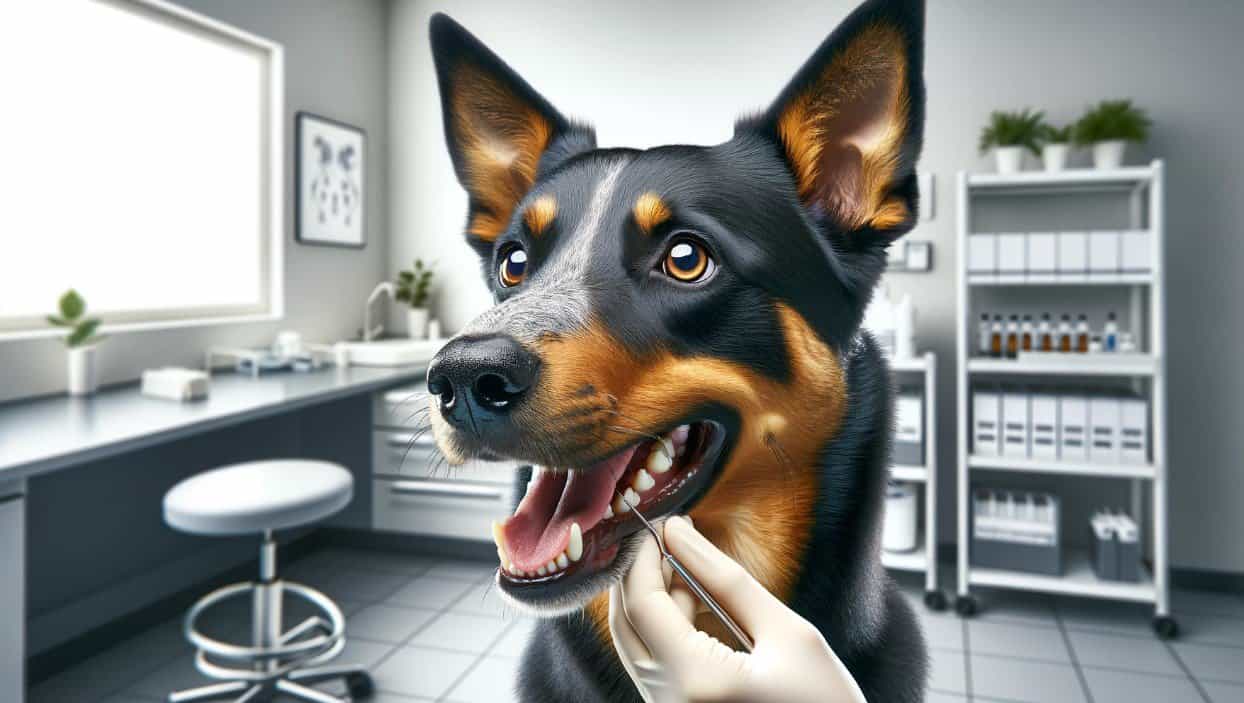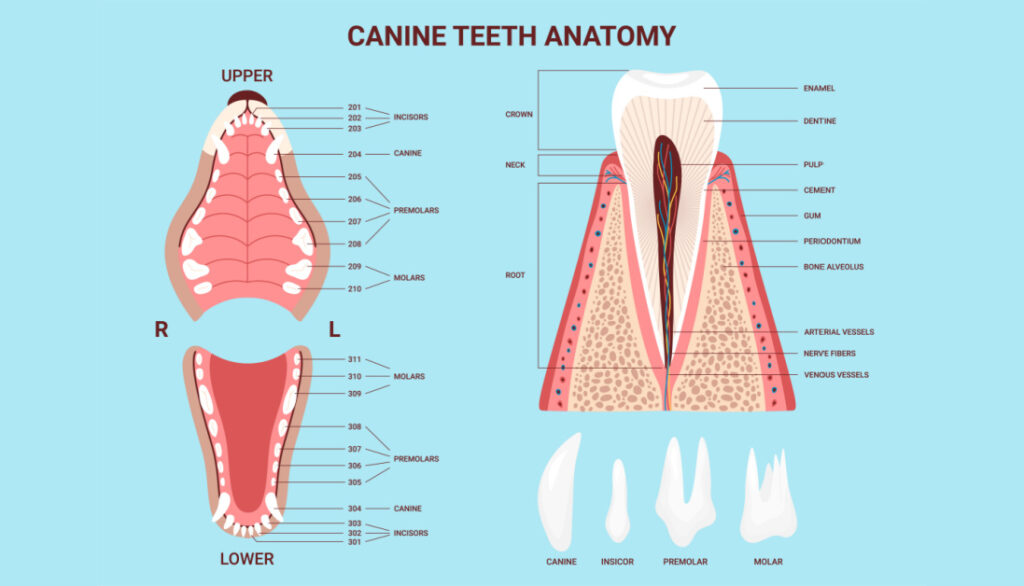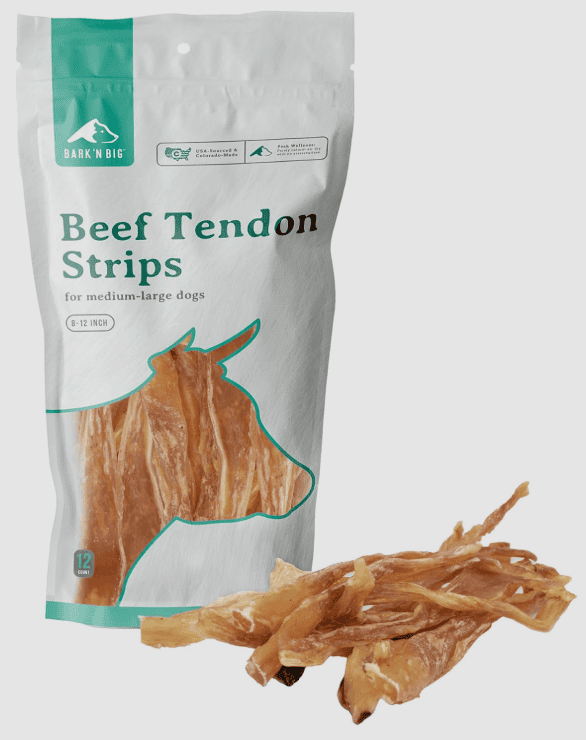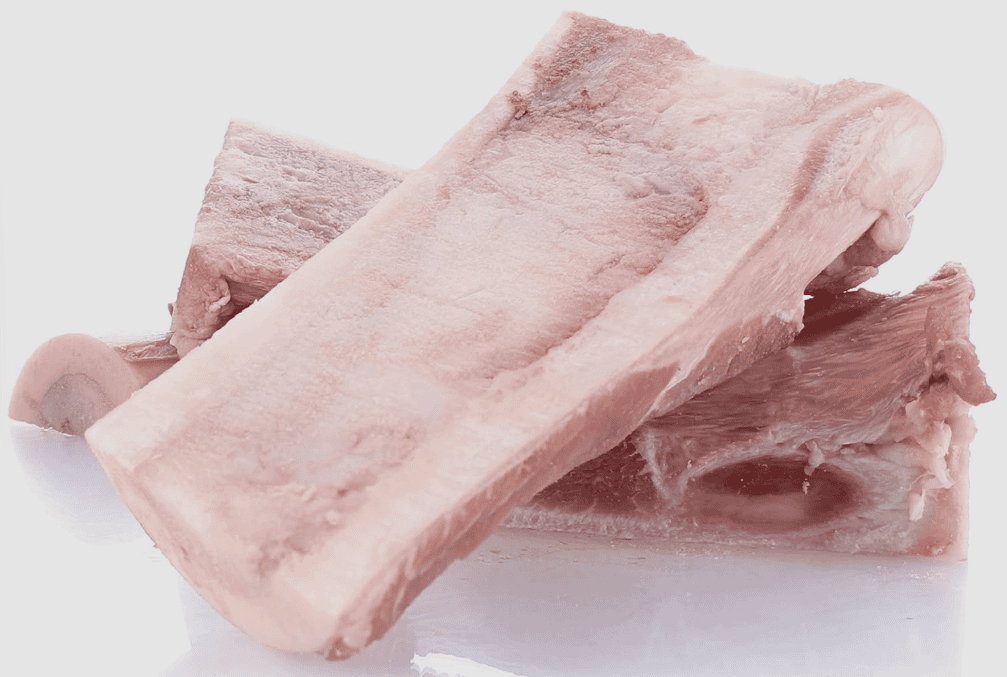Hello, fellow dog lovers! I’m Dr. Candy, your friendly holistic veterinarian. Today, we’re going to chat about a topic that’s often overlooked but is incredibly important – Australian Kelpie Dental Health. If you’re a proud parent of an Australian Kelpie, you’re well aware of their boundless energy and intelligence. But did you know that their dental health plays a crucial role in their overall well-being?
Just like us, our furry friends can suffer from dental diseases that can lead to serious health problems if left untreated. In fact, dental issues can often be a sign of underlying health conditions. So, maintaining your Kelpie’s dental hygiene isn’t just about keeping their breath fresh and teeth sparkling. It’s about ensuring they live a long, healthy, and happy life. Let’s explore how we can keep those canine smiles bright and healthy!

Signs of Dental Disease in Australian Kelpie
As a loving pet parent, you have a responsibility to keep your Australian Kelpie in the best possible health – and that includes their dental health. When it comes to Australian Kelpie dental health, it’s important to be aware of the signs of dental disease. This way, you can take action before minor issues turn into serious health complications.
First and foremost, bad breath is a common sign of dental disease in dogs. While it’s normal for your Kelpie to have a certain ‘doggy breath’, a foul or unusual smell can indicate an underlying issue. Another sign to look out for is a change in eating habits. If your Australian Kelpie is suddenly refusing food, chewing on one side, or dropping food while eating, it could be due to dental pain.
Physical changes in your Kelpie’s mouth can also indicate dental disease. These include:
- Red, swollen, or bleeding gums
- Brownish-yellow tartar buildup on the teeth
- Loose or missing teeth
Behavioral changes are another important indicator. If your Kelpie is pawing at their mouth, excessively drooling, or showing signs of irritability, it’s time to check their oral health.
It’s essential to remember that, like humans, dogs can hide their pain well. So, even if your Australian Kelpie seems fine, regular dental check-ups are crucial. This not only helps in early detection of dental issues but also contributes to overall Australian Kelpie dental health.
Now, you might be wondering – what are the common dental health issues in Australian Kelpies? And what can you do to prevent them? Stay tuned as I share more insights and tips to help you take the best care of your Kelpie’s pearly whites. Remember, prevention is always better than cure, especially when it comes to your pet’s health.
Common Dental Health Issues In Australian Kelpie
As a veterinarian, it’s important to me that you understand the Australian Kelpie dental health issues that your pet may face. The most common dental health issues in this breed include periodontal disease, tooth decay, and bad breath. These issues often result from a lack of proper dental hygiene and can lead to serious health complications if not addressed promptly.
- Periodontal Disease: This is an infection of the structures around the teeth, including the gums and bone. It usually starts as gingivitis and can lead to tooth loss if not treated. Symptoms include bad breath, red or swollen gums, and difficulty eating.
- Tooth Decay: Just like in humans, Australian Kelpies can suffer from cavities. This usually results from a diet high in sugars and can cause pain, difficulty eating, and tooth loss.
- Bad Breath: While bad breath can be a sign of other health issues, it is often a result of poor Australian Kelpie dental health. Regular brushing and dental chews can help combat this issue.
It’s essential to maintain regular dental check-ups for your Kelpie, as early detection of these issues can prevent more serious problems down the line. Remember, a healthy mouth is a significant part of your dog’s overall wellbeing.

Conventional Dental Health Treatments for Australian Kelpie
When it comes to maintaining your Australian Kelpie’s dental health, there are a few conventional treatments that can be very effective. However, it’s crucial to understand that every dog is unique and what works for one might not work for another. Here’s a look at some of the most common conventional dental treatments.
Anesthetic Dental Cleanings
One of the most common and effective methods for maintaining your Kelpie’s dental health is through anesthetic dental cleanings. This involves putting your dog under anesthesia so that a thorough cleaning can be performed. This process helps to remove plaque and tartar build-up, which are the primary causes of gum disease and tooth decay in dogs. However, this procedure should be performed by a trained professional and is usually recommended once a year.
While anesthetic dental cleanings are highly effective, they may not be suitable for all dogs. For instance, dogs with heart problems, drug sensitivities, or a history of seizures may not be good candidates for this procedure. Furthermore, extreme age may also pose a risk. Therefore, it’s essential to discuss these potential health obstacles with your vet before proceeding.
Potential Individual Health Obstacles
As previously mentioned, not all Kelpies will be suitable candidates for anesthetic dental cleanings. Dogs with existing health conditions such as heart problems may be at risk if put under anesthesia. Similarly, Kelpies with drug sensitivities could experience adverse reactions to the anesthetic.
Seizures are another potential obstacle. If your Kelpie has a history of seizures, the stress and strain of being put under anesthesia could potentially trigger an episode. Lastly, extreme age can be a factor. Older dogs often have a higher risk of complications from anesthesia, so it’s crucial to weigh the potential benefits and risks before deciding on this treatment.
In conclusion, while these treatments are conventionally used and can be highly effective, they may not be suitable for all Kelpies. Always consult with your vet to ensure you’re making the best decision for your dog’s dental health. Remember, maintaining your Australian Kelpie’s dental health is an essential part of ensuring they live a long, happy, and healthy life.

Dr. Candy’s Holistic Approach To Oral & Dental Health
As a pet parent, you’re always looking for the best ways to care for your Australian Kelpie’s dental health. It’s not just about keeping their breath fresh, but also ensuring their overall health and longevity. That’s why I recommend a holistic approach, focusing on diet and probiotics specifically designed for oral health.
Diet- Low Carbs, Avoid Added Sugars, Enzymes In Fresh Food
The diet of your Australian Kelpie plays a significant role in their dental health. A diet low in carbohydrates and devoid of added sugars can help prevent the growth of harmful bacteria in the mouth, which can lead to dental diseases. Carbohydrates break down into sugars, which can feed the harmful bacteria in your dog’s mouth, leading to plaque and tartar build-up.
- Low-carb diet: Foods like lean meats, vegetables, and certain fruits are low in carbs and beneficial for your Kelpie’s dental health.
- Avoid added sugars: Check the labels of your dog’s food and treats for added sugars. These can promote the growth of bacteria and lead to dental issues.
- Enzymes in fresh food: Fresh foods like raw carrots, apples, and celery can act as natural toothbrushes, scraping off plaque from your dog’s teeth. Additionally, they contain enzymes that can help break down food particles and fight bacteria.
Oral Health Specific Probiotics
Probiotics are beneficial bacteria that can help maintain your dog’s oral health. They work by balancing the bacteria in your dog’s mouth, preventing the overgrowth of harmful bacteria that can lead to dental diseases. I recommend Probiora for Dogs, an oral health-targeted probiotic.
Probiora is specially formulated with strains of bacteria that are beneficial for oral health. It can help reduce plaque and tartar build-up, freshen breath, and promote healthier gums. Simply sprinkle it on your Australian Kelpie’s food once a day. It’s easy to use and can make a significant difference in your dog’s dental health.
Incorporating these holistic approaches into your Australian Kelpie’s dental health routine can help maintain their oral health and prevent dental diseases. Remember, a healthy mouth contributes to a healthy dog!

When it comes to maintaining your Australian Kelpie’s dental health, it’s crucial to understand that not all dental chews are created equal. Many commercially promoted dental chews, while marketed as beneficial, can actually do more harm than good. These products often contain a host of artificial ingredients and added sugars, which can lead to a multitude of health issues, including obesity and diabetes. Moreover, they don’t effectively address the root cause of dental problems in dogs, which is typically a buildup of plaque and tartar.
Another commonly promoted solution for canine dental health is the use of drinking water additives. However, these products can harm the beneficial bacteria in your dog’s gut, disrupting their microbiome and potentially leading to digestive issues. It’s always best to consult with a veterinarian before introducing any new products to your dog’s diet.
Dr. Candy’s Recommended Dental Chews & Products
When it comes to dental chews, I recommend sticking to single-source natural proteins. These not only help to clean your dog’s teeth but also provide them with valuable nutrients. Here are a few options to consider:
Tendons
Tendons are a fantastic natural chew for your Australian Kelpie. They are tough and fibrous, which helps to scrape off plaque and tartar from your dog’s teeth. Plus, they are a good source of protein and collagen, promoting good joint health.

Raw Marrow Bones
Raw marrow bones are another excellent choice for maintaining your Australian Kelpie’s dental health. They are a natural source of calcium and phosphorus, which are essential for healthy teeth and bones. Furthermore, the act of gnawing on bones can help to clean your dog’s teeth and gums.

Bully Sticks
Bully sticks are made from 100% beef muscle, providing a natural and digestible chew for your Australian Kelpie. They can effectively remove plaque and tartar and are a good source of protein. However, always supervise your dog while they’re chewing on a bully stick to prevent any choking hazard.

Remember, the best way to maintain your Australian Kelpie’s dental health is through a combination of regular veterinary check-ups, a balanced diet, and the right dental chews. By taking these steps, you can help ensure that your Kelpie has a healthy and happy life, free from dental disease.
Final Thoughts
Australian Kelpie Dental Health is not something to be taken lightly. By understanding the potential pitfalls of commercially promoted dental chews and water additives, and by choosing natural, single-source protein chews, you can play a pivotal role in maintaining your dog’s oral health. Remember, your Kelpie’s dental health is an important part of their overall wellbeing, so make it a priority!
Frequently Asked Questions
1. How can I prevent bad breath in my Australian Kelpie?
Regular dental care is essential to prevent bad breath in Australian Kelpies. Brush your dog’s teeth regularly using a dog-specific toothbrush and toothpaste. Additionally, provide dental chews or toys that help clean their teeth and freshen their breath.
2. What are some signs of dental problems in Australian Kelpies?
Some common signs of dental problems in Australian Kelpies include bad breath, yellow or brown tartar buildup on teeth, swollen or bleeding gums, difficulty chewing, pawing at the mouth, and reluctance to eat hard food.
3. Can I use human toothpaste to brush my Australian Kelpie’s teeth?
No, you should never use human toothpaste for your Australian Kelpie. Human toothpaste contains ingredients that are toxic to dogs if swallowed. Always use toothpaste specifically formulated for dogs.
4. How often should I take my Australian Kelpie for professional dental cleanings?
Professional dental cleanings for Australian Kelpies are typically recommended once a year. However, the frequency may vary depending on your dog’s individual dental health and the advice of your veterinarian.
5. Are there any natural remedies for bad breath in Australian Kelpies?
While regular dental care is the most effective way to combat bad breath, you can also try adding parsley to your dog’s food, as it may help freshen their breath. However, it’s important to consult with your veterinarian before introducing any new remedies or supplements to your dog’s diet.
